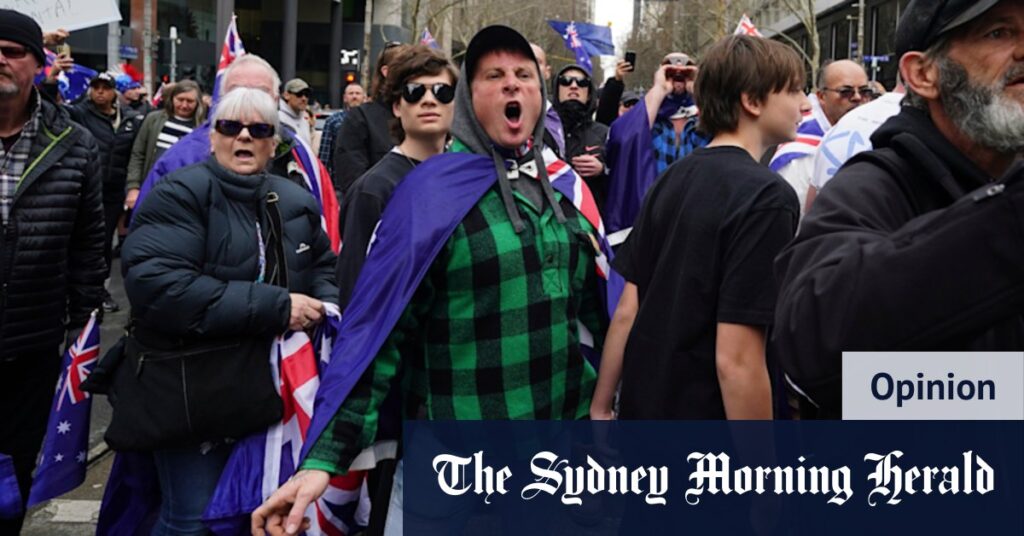As the crowd travelled back down Bourke Street, tensions escalated. On the other side of the road, I heard shouting and a crowd collecting around a man carrying an Aboriginal flag. Concerned, I moved towards him, past a wall of jeering and invective. Lots of noise, no communication.
The moment I stood next to him, a woman pointed at me and started chanting “Deport, deport, deport.” Another protester pointed to his mate: “See this guy? This is the kind we want.” His friend declared he’d been here 30 years and had “assimilated”. I’ve been here 30 years too, yet found myself literally and ideologically on the other side. But it didn’t seem like the right time to make that point.
Loading
Soon aggressive face-offs erupted between anti-migrant protesters, who I was among, and counter-protesters. Bodies pressed, lots of yelling. A woman selling The Big Issue collapsed her table as the crowd tightened. Among the noise, I listened hard. No coherent views on immigration composition. No discussion of targets.
An irony I still haven’t shaken off is the sight of the only two conspicuously non-white protesters I observed, Asian women, tightly gripping their white male partners’ hands, seemingly for protection more than romance.
This revealed the conditional nature of acceptance I experienced moving among the protesters for two hours. Was I safe? Only when I kept my mouth shut. You’re permitted to be an immigrant if you stay within their prescribed perimeter. They’ll tell you about their medication list and migrant wives. Cross the boundaries by challenging their views and suddenly it’s “Deport, deport, deport.” Their civil discourse requires you to speak when they want, how they want. The second you say something they don’t want to hear, your words seem to evaporate, and civility thereafter.
There is a need for rational conversation about immigration levels and composition. But conversation becomes impossible when one side is marching with Nazis. The tragedy isn’t that thousands gathered to express frustration. It’s not even that Nazis attended. It’s that nuance never showed up; violence did.
Loading
The worst of the skirmishes happened far from me. Yet, the perceived threat of violence was implicit and ever-present. A 7-Eleven on Bourke Street had closed due to “unforeseen circumstances” – hardly unforeseen given Indians were singled out in social media posts by organisers. When I finally arrived at Flora Indian Restaurant, usually bustling but today near empty, the manager said there’d been “no trouble,” but said that it was unusually quiet.
My mother’s protective instincts were justified. But the protest soon ended. The aggrieved rolled up their flags and bled into the streets, becoming indistinguishable from everyone else boarding trams and trains. Was I now walking alongside a “bad apple”? I couldn’t tell someone’s character from their appearance. The noise had ended, but the conversation never began.
Dr Vyom Sharma is a medical commentator and general practitioner in Melbourne.
The Opinion newsletter is a weekly wrap of views that will challenge, champion and inform your own. Sign up here.
Read the full article here

